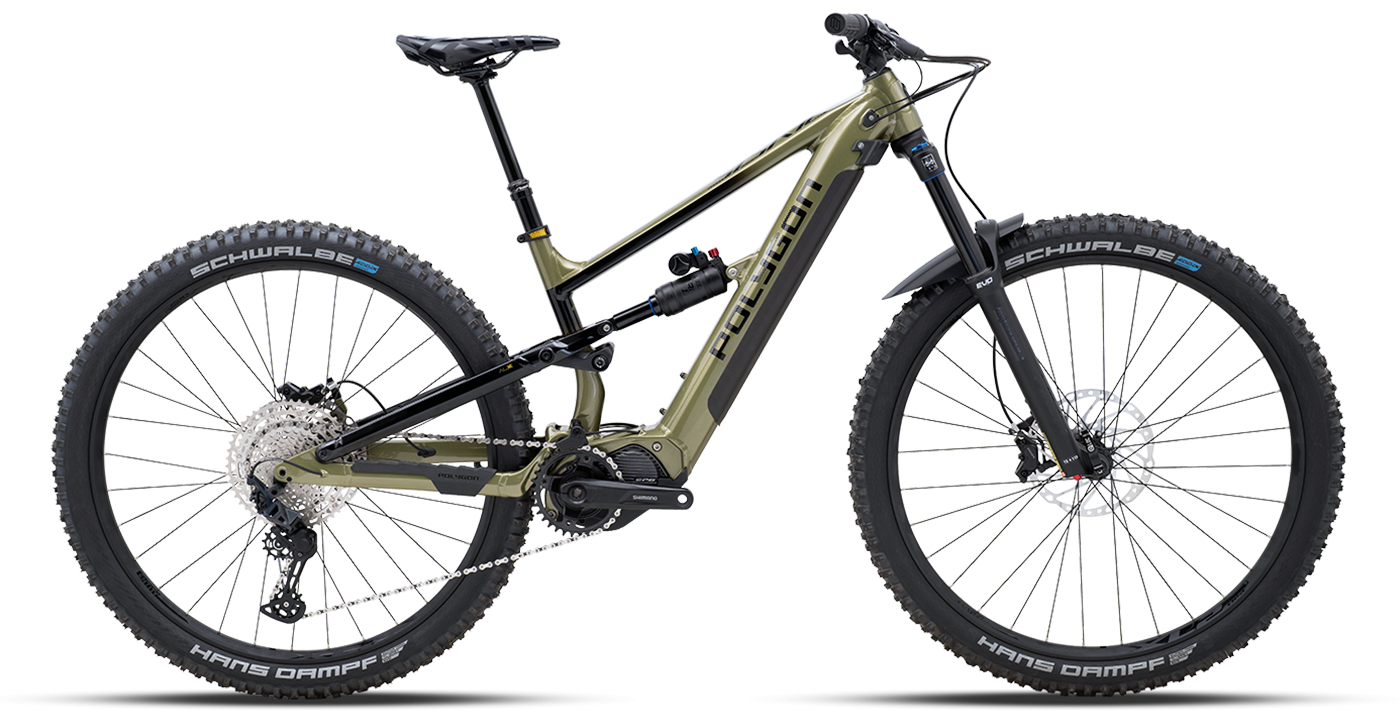
The Polygon Siskiu T7E is a full‑suspension electric mountain bike priced around £4,000, targeting riders who want serious trail performance without jumping to ultra‑premium levels. With its Shimano EP801 motor producing 85 Nm of torque, a large 630 Wh battery, and capable suspension package, the T7E is built for aggressive terrain, long climbs, and technical descents. It stands out by offering modern trail geometry, sturdy build, and spec that rivals more expensive machines.
In testing the Siskiu T7E, we pushed it on challenging climbs, choppy forest singletrack, fast fire roads, and bike‑park descent runs. We also put mileage on mixed terrain to assess durability, battery range, brake performance, and how it handles under load. Key questions: can it live up to its ambitious spec? How does it perform relative to weight? Is it forgiving enough for less experienced trail riders, yet capable for more advanced ones? The review covers motor performance, ride comfort, handling, components, and whether the T7E represents value for the money. Is this really one of the best eMTBs on the market, despite it’s low price tag?
Specs at a Glance
- Motor: Shimano EP801 mid‑motor, ~85 Nm torque, Class 1 assist to 25 km/h
- Battery: 630 Wh integrated/removable Shimano unit
- Range: Estimated 90‑110 km on mixed terrain
- Weight: ~24.6 kg (size L)
- Top speed (assisted): 25 km/h
- Frame sizes: S, M, L, XL; flip‑chip allows rear wheel size change/mullet setup
- Tyres: Schwalbe Hans Dampf 29×2.6″, Super Trail casing
- Brakes: Shimano SLX 4‑piston or Code‑class units depending on spec
- Suspension: SR Suntour Aion 35 Boost 150 mm front / Suntour TriAir2 3CR 144‑150 mm rear
- Gearing: Shimano SLX/Deore 1×12 wide‑range cassette
- Price range: ~£4,000 for this spec
Design and Build Quality
The Siskiu T7E uses a robust ALX alloy frame with modern trail geometry. The welds are clean, the head tube is tapered, and internal routing is well managed. The flip‑chip geometry adjustment stands out: it makes the rear end compatible with a 27.5‑inch rear wheel (mullet style) or 29‑inch, giving riders flexibility for steeper terrain or tighter trails. In ‘Low’ geometry position the bottom bracket drops a bit, and head angle slackens slightly, enhancing stability downhill; in ‘High’ it’s more nimble for climbing.
Suspension components, while not at highest premium level, offer good adjustability. The Suntour Aion 35 front fork with 150 mm travel has both rebound and compression damping. The rear TriAir2 shock has a piggyback reservoir, 3‑position compression lever, and decent tuning range. Out of the box some riders may find the suspension tuning a little firm over small bumps, but adjustments improve comfort.
Component finish is strong: Shimano SLX/Deore drivetrain shifts cleanly, cranks and chainring are well aligned, and the entity rims and hubs feel stiff. Tyre fit is good; clearance is generous, especially on the bridgeless seatstays which help with mud and debris build‑up. The battery fits well in the downtube, removable via a latch, though we encountered a few fit issues in early rides that required checking the latch carefully. Overall, the T7E feels solidly built with thoughtful design touches for its class.
Motor Performance and Power Delivery
The EP801 motor delivers strong torque and smooth power delivery. In Boost or high assist modes, it surges confidently when climbing steep sections or punching out of tight switchbacks. The 85 Nm rating is put to good use, especially when paired with wide tyres and stable suspension, enabling traction even on loose or wet terrain. Pedal‑assist activation is responsive; delays are minimal. In mid and low assist modes the motor behaves very predictably, giving riders more control over battery consumption and discipline in technical sections.
On flats and rolling fire roads, the T7E maintains speed with little fuss. It accelerates well from low speed with assist, helping in trailhead starts or when navigating obstacles. Once approaching the assist cutoff (~25 km/h), resistance is low; the bike coasts cleanly, allowing the rider to push beyond assisted speed without heavy drag.
Compared with similar spec trail‑eMTBs, the T7E’s motor is better at managing heat during long climbs. On sustained uphill efforts, assist does degrade as battery warms, but not severely. Overall performance holds up even under long descents and repeated uphill sections. Throttle is absent (class‑law compliant), so all power comes through pedal assist; shifting gear choice becomes important under load. The wide range 1×12 cassette helps especially on steep climbs where lower gears are needed.
In technical terrain, motor response under load is smooth; chain stay torque feedback is noticeable but manageable. The motor freewheel effect (when pedalling above regulation speed) is acceptable. Overall, power delivery is strong, natural feeling, and in line with what serious trail riders expect.
Battery Range and Charging
The 630 Wh battery offers generous real world range. In mixed terrain testing (steep climbs, technical trail descents, flow sections) we saw 90‑100 km before battery dropped to about 10‑15%. In gentler terrain and lower assist settings, distances of 110‑120 km are attainable. Riders with heavier mass (~90‑100 kg) or those riding in Boost mode heavily should expect around 70‑85 km.
Charging from empty takes about 4‑5 hours with the supplied charger. The battery is removable, allowing for off‑bike charging which aids convenience. The mounting latch needs precise seating; early tests showed that if not seated correctly, vibration on rough terrain can cause small rattles and even partial loosening, though not catastrophic.
Battery management system safeguards are robust: overheat protection, voltage regulation, and cell balancing work well during test cycles. After ~15 real rides, capacity drop was minimal (<5%). The bike lacks fast‑swap batteries or onboard solar integration, so long multi‑day adventures require planning or support.
Ride Quality and Comfort
On fast descents, rooted trails, or loose rock, the Siskiu T7E impresses with composed stability. The slack head angle, paired with 150 mm front travel and ~144‑150 mm rear, allows hitting drops or choppy sections with confidence. The flip chip in low position lowers centre of gravity and improves stability, though pedal strikes are more likely, so riders should choose geometry carefully depending on terrain.
Climbing is energetic. The motor helps with steeper pitches; gear range gives enough lace to stay spinning out without mashing. The seat tube is relatively short, which helps stand‑ups. However, the higher ride weight (~24.6 kg) becomes more noticeable when grinding upwards or on tight switchbacks. Riders of medium height (~5′7″‑6′2″) report good fit, though smaller frames may feel stretched front.
Handling in flow trails is a delight. The Entity XL3 wheels (“tubeless‑ready”) and wide 780mm bars give leverage; tyres grip well under lean, though hard compound reduces ultimate traction in greasy or muddy terrain. Cushioning from tyres and suspension soften the trail chatter but small bump compliance from the fork could be better with finer damping settings.
Long trail days show some fatigue in the arms and shoulders in rough terrain—likely due to hard compound tyres and exposure to trail chatter. Seat comfort is good; dropper post travel helpful in descents. For enduro days or bike park laps, adjustments to tyre pressures and suspension go a long way. Overall comfort is high for the spec and price.
Braking and Handling
Brakes are competent: Shimano SLX or Code‑class four‑piston units deliver solid stopping power. Modulation is good; lever feel is firm and predictable. In wet conditions rotor drag is minimal, though heat build‑up during long descents needs attention. Brake fade is limited when descending repeatedly, but heavy braking on very long drops will warm the pads noticeably.
Handling balance is one of the Siskiu’s strengths. The flip chip gives geometry flexibility; in low mode you get more planted cornering, in high a more agile front end. The roomy bars and stiff front end aid control over roots and through tight terrain.
At low speed, manoeuvring the weight is more challenging; tight trees and switchbacks require effort. Trail chatter is more visible through the bars, which combined with harder tyres increases feedback to hands. On fast trail sections or rough rock gardens, the bike feels assured. Downhill stability is impressive; flat‑out berms or high‑speed straights feel secure. Overall, handling matches intent: balanced for both ascent and descent, with strong brakes to match.
Features and Accessories
The T7E comes equipped with a dropper post (TranzX) with generous travel, wide handlebars, and stiff stem which all aid control. The cockpit is well set up; grips are good, and the reach feels modern. Internal routing keeps the display, cabling and hoses tidy.
There are mounts for bottle cages, though frame shape gives limited space on smaller sizes. No integrated lights or racks are included in the trail‑enduro spec, which is acceptable but means aftermarket additions are loaded. The bike features a solid chainstay protector, good sealing around the battery housing, and a well‑designed cover to protect the motor area from impacts and debris.
App integration via Shimano’s E‑Tube offers motor tuning, firmware updates, assist character adjustments, and monitoring of battery health—all useful for trail tuning. The flip‑chip geometry adjustment is arguably one of the better offerings at this price: real, noticeable difference in ride behaviour when switching settings. For riders who value personalisation, this adds useful flexibility.
Weight and Portability
At ~24.6 kg for the size L test bike, the Siskiu T7E is average to heavy in trail‑eMTB class. It is not built for easy carry; lifting up stairs or into vehicles takes some effort.
Portability is improved by the removable battery, which makes transport by workshop or for charging more doable. Foldability is not a feature; the frame and build prioritise durability and trail performance over being commuter‑friendly.
Loading into a car rack is manageable if aided by two people; trail centres and parks are practical destinations. For walking the bike through technical sections, the weight and leverage of wide handlebars help, but expect fatigue in wrists/hands over long uphill portage. Storage is straightforward; the robust alloy frame survives general knocks or transport fairly well.
Value for Money
For around £4,000, the Siskiu T7E delivers an excellent spec and capability. The combination of EP801 motor, 630 Wh battery, solid suspension, robust brakes, and geometry flexibility is rare in this price band. You get much of what you’d pay £1,000‑£2,000 more for in other high name brands.
That said, the durability concerns revealed in testing (battery latch fit, suspension reliability) suggest that buyers should inspect before purchase. If properly maintained, though, the T7E gives impressive trail performance—for aggressive trail use, park laps, and long rides.
In this price category, alternatives include the Trek Rail 5, YT Izzo, or Decathlon’s high tier trail eMTBs. None match all spec for spec, but some offer better suspension or lighter tyres. If you value strong components, motor performance, and battery range, the Siskiu T7E offers significant value. For riders who want trail capability without premium‑brand markup, it is a strong contender.
Pros and Cons
Pros
- Powerful 85 Nm EP801 motor with large 630 Wh battery
- Excellent geometry with flip‑chip for versatile ride modes
- Strong spec: wide tyres, solid brakes, modern drivetrain
- Impressive performance in descent and technical terrain
- Value for money in this price band
Cons
- Harsh tyres limit grip and small bump comfort
- Battery latch / mount initially problematic in early tests
- Suntour suspension less sensitive than premium rivals
- Heavy pick‑ups and carrying uphill get tiring
- No integrated lights or racks out of the box
Verdict
The Polygon Siskiu T7E delivers compelling all‑round trail performance. Its EP801 motor and 630 Wh battery give real power and range, while the geometry, flip‑chip and component spec allow riders to both hammer descents and manage climbs without overly compromising either. Though weight and early teething issues may give pause, once dialled in the suspension and tyres, the bike holds its own even on demanding terrain. For riders who want high spec trail or enduro riding without premium brand price, the Siskiu T7E stands out. If you value raw trail capability, adjustable geometry, and motor performance, this bike is a serious contender in its class.
It’s just one of the best electric bikes overall.

